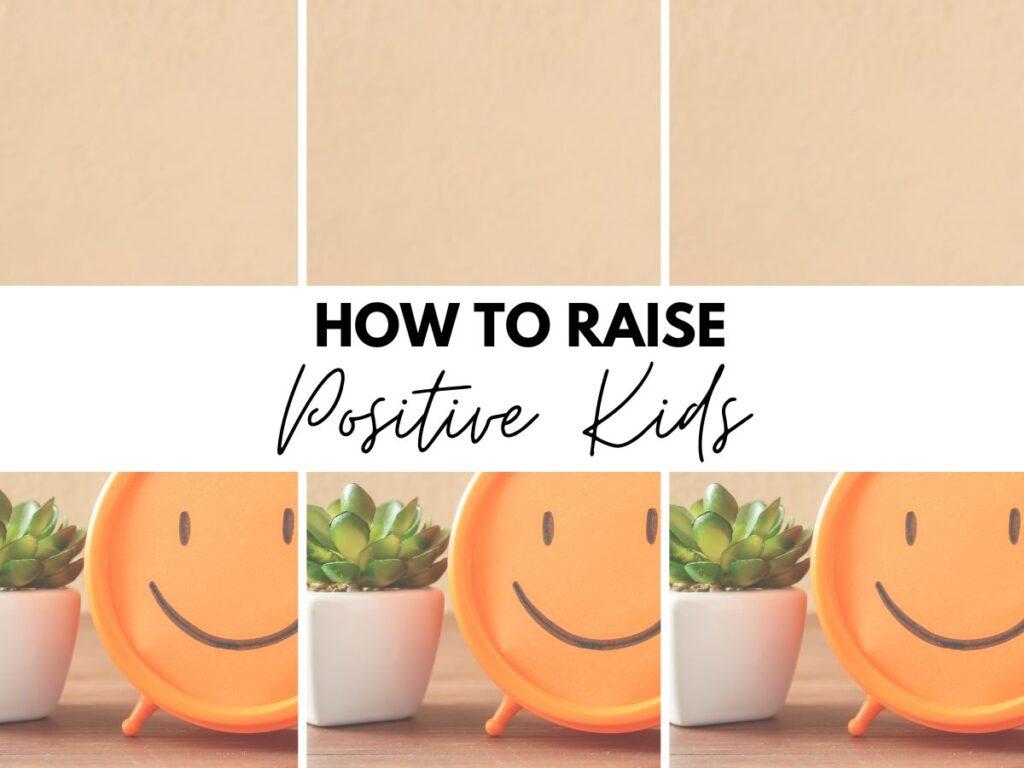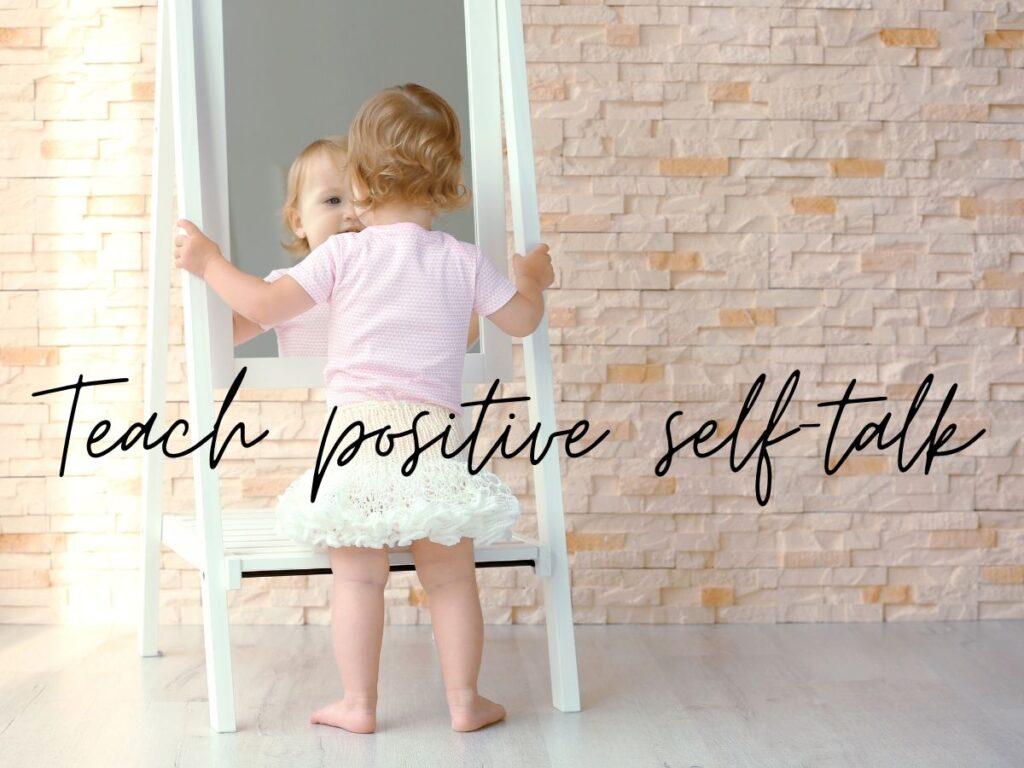This post may contain affiliate links. Disclosure here.
Sometimes, as parents and teachers, we think that our children are born with a positive or negative outlook on life. This is going to be all about how to raise positive kids.
The truth is, kids’ attitudes are formed through their experiences with their families and peers. As adults, it’s up to us to teach our children how to think positively and approach challenges in productive ways.
The more we can help our children develop positive thinking patterns, the more we can influence their future. This post is dedicated to how to raise positive kids!

Here’s how to raise positive kids:
1. Encourage positive self-talk, and model it.
You might wonder how to raise positive kids in an increasingly negative and difficult society. Firstly, encourage positive self-talk from your child right from the start!
Teach kids how to set goals and create a vision for what they want/aspire to be. A vision board can be a great way to introduce this idea. (Here’s a link to How to Make a Vision Board for Kids, with a FREE printable resource included!)
As the parent, you are your child’s primary role model for how to think about themselves. This is why it’s important to model positive self-talk for them:
- Positive self-talk helps kids achieve their goals and feel good about themselves. If your child believes that they can accomplish any goal if they just try hard enough and put in the effort, then this will motivate them to work harder. And if the goal is something that isn’t easy or simple to achieve (like getting better grades), then this belief will help them get through tough times when things get frustrating or challenging—because they know it’s all a part of reaching their end goal!
- Kids with high self-confidence are also better decision makers because they know their own abilities and don’t doubt themselves.
- Encourage positive self-talk by asking questions like “What did you do well today?”
- When your child has achieved something amazing or overcome an obstacle successfully acknowledge it and give them praise!
- A simple “Good Job!” or “I’m so proud of you!” can go a loooong way.

2. Teach kids that their actions have consequences
Actions have consequences. This sounds like a no-brainer, but when it comes to our children, we sometimes treat them as if they were infallible—as if they can’t do anything wrong and will always know what is right.
Kids need to be taught that actions have consequences.
But like everyone, kids make mistakes and they often don’t understand the consequences of their actions.
Even then, some parents may not want to disappoint or discipline their child by telling them that they must face negative results because of something they did wrong.
Working in education and childcare I have seen this ALOT. Kids need consequences!

3. Be a positive role model
As a parent, it’s your responsibility to show your child how to be positive. If you want them to be happy and successful, you should learn how to make sure that they see the good in life.
You can do this by being a positive role model for them and other family members. The same goes for friends and colleagues—and even society as a whole!
With so many negative influences in the world today, it’s easy for kids to get sucked into negativity without even knowing it. But if you want your children (and possibly even yourself) to live happier lives with more meaning than “getting by” every day just because they have no idea what else they could do with their time instead of feeling bored all summer long? Then we suggest learning how being positive will help everyone out in some way shape or form!

4. Remember your empathy and understanding, even during power struggles
In order to develop a strong relationship with your child, it’s important to remember that empathy and understanding are key. Kids need to know that you understand what they are going through.
It’s also important for them to trust you as their parent.
Empathy is not the same as sympathy. It means feeling for someone else; it isn’t pitying or patronizing them, but rather seeing things from their perspective so you can better understand why they make choices in life (or don’t).
Showing empathy is one way of showing someone that you care about them and that their feelings matter to you—whether or not those feelings align with yours!

5. Reinforce kids for good behavior
In order to raise a child who is well-behaved, it’s critical that you reinforce good behavior. The more you reinforce positive behaviors, the more likely your child will repeat them.
There are many ways to do this—you can praise good behavior (“You worked hard on your homework today!”), reward it by giving a privilege or material item (giving a favorite toy if he cleans up his room), encourage it by taking the time to explain why certain actions are important (“You’re being careful with those scissors because you don’t want to hurt yourself”), or make reinforcing good behavior part of your daily routine (by discussing what went right during their day and offering praise).
It’s important that parents reinforce positive actions as soon as possible so that children learn how they can earn attention from their parents and other adults by doing things right before they ever think about doing wrong.

6. Catch your child being good, and point out how their good behavior is helping them achieve their goals
Let your child know that you’re paying attention to them. When they’re outgrown their clothes or toys, bring it up and ask how they’d like to spend the money from the sale of their old things. Ask them what they’re most excited about in school and invite them to tell you about it. When they make a good choice (or even an okay one!), point out why it was smart for them and how that decision helped them achieve a goal, whether it’s getting ready for bed on time or managing not to get upset when another child takes something away.
When you catch your child being good, let them know! Pointing out positive behavior helps kids understand what’s expected of them, which reduces stress and improves self-esteem—even if they don’t always meet those expectations every single time!
7. Ask kids about their interests and engage in activities they enjoy
Don’t simply assume what your kids enjoy or their interests. Of course you know them and know the things they like but give them space to explore new curiosities.
- Ask what they like to do.
- Find out what they are good at.
- Ask them what they like to learn about.
- Figure out what they actually like to read.
- Find out what they like to watch, listen to or play with.
8. Encourage children to find solutions on their own, but be there if they need you
- Let them know you are there for them, but don’t be intrusive.
- Don’t hover over your child and watch everything they do.
- In fact, the best thing a parent can do is give their children independence and let them make some mistakes in life so that they learn from those mistakes on their own.
- Be careful not to hover or keep an eye on every action of your child’s life. Which will only make them feel as though they are being watched at all times and may cause them to feel like they have no privacy whatsoever.
- It’s important for kids to feel secure in their own space if we want them to flourish socially or academically; but this doesn’t mean that we need to constantly patrol our kids’ activities or follow after every move they make!
- Instead, try spending time with each other without having any agenda other than just enjoying each other’s company—you’ll soon discover that after spending time together regularly (even if it’s just once per week), both parties will begin looking forward with excitement toward these interactions because these moments provide much-needed relief from daily stressors like work deadlines or household chores like cleaning dishes.”
9. Help kids find ways to express their fears and concerns
Raising a happy, positive child can be challenging at times, but there are many ways in which you can help your kid find their way.
As a parent, it’s important to communicate with your child about the things that scare them and try to understand what is making them afraid. Encourage them to talk about these things with you when they need reassurance.
You’re off to great places! Today is your day! Your mountain is waiting, so get on your way!
Dr. Seuss
Final Thoughts:
Kids can be taught positivity.
I’ve said this before and I didn’t realize it was such a controversial statement. However, I said it before and I’ll say it again louder. “KIDS CAN BE TAUGHT POSITIVITY!.”
No, not all children who are brought up to be positive thinkers will grow up to be these wonderfully complete people. But wouldn’t you rather set them up for the most successful life path you possibly could?
You can teach your child to be positive. When you do, you’ll see the impact it has on them and their interactions with other people.
Positive kids are happier, healthier, more successful and make better choices than negative kids. It’s not just a nice thing to do—it’s important to teach your kids to be positive.
You can give children a headstart in life when you teach them to be positive thinkers!
Positive parenting is all about helping your child develop a strong sense of identity and self-worth. It’s about teaching kids how to be resilient, and how to take responsibility for their own actions.
It’s about setting clear boundaries that are consistent, and enforcing them consistently, too. Positive parenting teaches children that they will be punished if they do something wrong.
Even if that punishment is just having to clean up the mess they made or missing out on time with their friends because they were late getting home from school.
It’s also about helping them figure out who they are as individuals and what they want in life. Positive parenting encourages kids to explore their interests, develop hobbies, and build relationships with their peers. Which gives them practice at being social with others outside of their immediate family members!
Conclusion
Teaching positive values and habits to children is a lifelong process, but it’s also one that can start now. The more you practice these techniques in your home, the more your child will learn to be positive. Remember that positivity is not just about avoiding negative language and behavior—it’s also about encouraging good practices and being a role model for your child.
You Might Also Enjoy:
31 Positive Affirmations for Kids (Free Printable Cards Included)
Leave a Reply